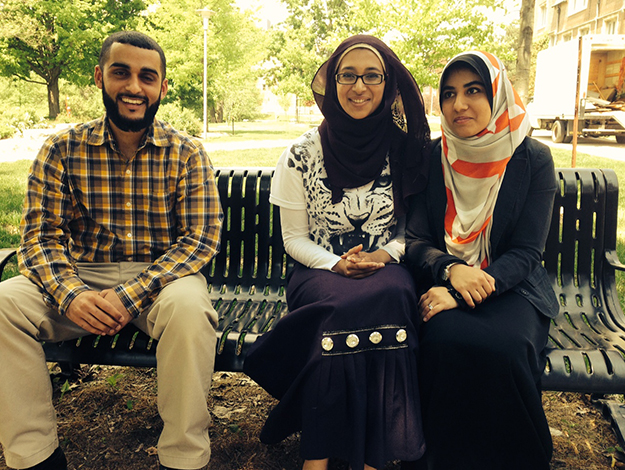Ontario’s universities are transforming their communities, new report shows

'When we said there’s treatment and help available for you, they were so relieved,' said Kashmala Qasim, a member of the Healthy Active Living group. From left to right: Asim Siddiqi, Naushin Sholapur and Qasim.
The most innovative healthcare can go unused if people don’t think it’s aligned with their cultural or religious beliefs.
That’s why grad students and alumni from the University’s Healthy Active Living Group visit Muslim organizations in Hamilton and Toronto to talk about nutrition, fitness and mental health.
The group speaks to audiences of new Canadians who may not be aware that there are Muslim counsellors who understand their cultural or religious circumstances and can treat them in a context that is comfortable.
The program is just one example of how McMaster interacts with its surrounding community and is highlighted in a new report produced by the Council of Ontario Universities.
Ontario’s universities are dramatically transforming the 33 communities in which they are rooted – socially, culturally and economically – and opening the door to a wide range of community-based learning opportunities for students, according to the report.
Change Agent – Ontario’s Universities: Transforming Communities, Transforming Lives demonstrates the many ways universities, students, faculty and staff are improving their communities, from free medical services for at-risk groups, to culturally sensitive mental health outreach, and innovative campaigns that save lives.
“Not only are universities preparing students for career and life success, they are teaching these young people how to be responsible citizens,” says Max Blouw, COU Chair and President of Wilfrid Laurier University.
“There is no better way to impart that knowledge than by getting students actively engaged in their communities, which is why community learning continues to be such an important part of university programming.”
Creating inclusive, forward-looking programs alongside leading research, universities are hubs of community engagement that empower students, faculty and staff to improve lives and strengthen cities.
“At campuses across Ontario, I’ve seen firsthand that universities are not only institutions where students can pursue their passions and learn valuable skills, they are also integral parts of the community fabric,” says Reza Moridi, Ontario’s Minister of Training, Colleges and Universities.
“Our province’s universities make a sustained effort to work closely with local partners and connect students to the people and places around them, and Ontario benefits greatly as a result of this engagement.”
Key findings:
• Universities inject billions of dollars into Ontario cities each year, and are therefore a core component of Ontario’s economic growth.
• Postsecondary institutions generate more than $55 billion in economic activity in Canada every year, according to a 2014 report by the Conference Board of Canada. Almost 700,000 direct and indirect jobs are attributable to spending by postsecondary institutions.
• Many thousands of university students, faculty and staff are improving their communities – they are developing their own initiatives, creating non-profit organizations, establishing outreach programs, and inventing innovative products that solve critical issues around the globe.
• An average Ontario faculty member devotes about 20 per cent of their work hours to services, such as informing policy and using their skills and knowledge to enhance communities on local, national and global scales.
• By cultivating strong relationships with organizations that support children and youth, universities are helping to set up countless young people for healthy, prosperous and fulfilling lives.
• Ontario’s universities work closely with local organizations to tackle issues such as violence, bullying and mental illness.
“Students have won hundreds of awards for work in Ontario’s communities, and they often find or create jobs out of these experiences,” says COU President and CEO Bonnie M. Patterson.
“Ontario’s universities are training future professionals in so many fields – it only makes sense to use that knowledge and passion to better our communities. When our communities benefit, we all benefit.”
Read the full Change Agent report here.
View quick facts from the report here.

